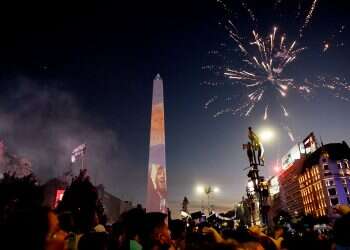With all due respect to soccer, the weather provided the biggest surprise on Satruday in Qatar: in the morning it suddenly started to rain.
Follow Israel Hayom on Facebook, Twitter, and Instagram
It was indeed a short rainfall, which dried up quickly, but still – it was rain; rain that caused everything to start later than expected. Except for the Moroccan fans, who flooded the streets, everyone else was much more relaxed. Besides, Saturday night ended very late: the fans left the Lusail Stadium only after 1 a.m., hours after the penalty shootout drama between Argentina and the Netherlands was over. The Albiceleste fans celebrated for many hours in the streets, until returning to their hotels. Their celebration was twofold: both the qualifying for the semi-finals and Brazil's defeat by Croatia in the first quarter-final.
The Argentinian presence is very visible in Qatar, but it needs to be pinpointed. More than support for Argentina at large, this is support for Messi. Support for Morocco, on the other hand, is simpler and much more authentic. It is also a one-off: Argentina will return to these late-stage knockout rounds, even without Messi, but Morocco will probably not. That's why it enabled a greater outburst of emotions from more than just the Moroccan fans, and swept the entire Arab and Muslim world into it.
Yesterday in Doha you could also meet a considerable number of Israeli Arabs who came to watch Morocco. In the future, there will possibly be those who will conduct a sociological research to examine in depth national and nationalistic feelings that arose during the World Cup (including any connection to the Palestinian issue, and it is not clear how this issue is really important is to all those who raised the Palestinian flags here). And yet, it can also be regarded in a more romantic way: identifying with the underdog, who for one moment found himself at a party of true equals, and did not want it to end.
An impressive soccer celebration
In addition to the Argentinian-Moroccan presence, Qatar did put on an impressive soccer celebration, but fans' celebration there was quite lifeless in comparison to other major sports events. It is not clear if it is the prices, the security, the boycott imposed by many European fans, or the lack of alcohol. Either way, it is hard to imagine a day during which England meets France for a quarter-final and the streets aren't filled with drunk and vulgar fans. They were not in Doha yesterday, and this is what was missing; Their place was taken by countless "soccer tourists," many of them Israelis, who came to experience the biggest celebration in the world.
The majority of fans were hoping for a semi-final between Argentina and Brazil, and almost got the Netherlands against Croatia. This caused quite a few moments of heart palpitations for those who had paid thousands of Dollars to be here, until Otro Martinez scored Argentina's last penalty. Nir and Chaim, for example, came from Las Vegas, and prayed for a semi-final between Messi and Neymar. They watched the quarter-finals between Brazil and Argentina during their stopover in London. When they arrived in Qatar, they rushed to the popular Abu Shariha Hummus Bar, located in the Al Waqif Market, to feel a little taste of home.
This hummus bar serves excellent food, but its pace is Mediterranean. Everything happens slowly: you get a small white slip with a number, and you are asked to come back in an hour or two, when there is room, and even then you still have to wait. And when you're finally seated, it takes forever for the waiter to show up, then for the food to be served, and then for the bill to be given. What's more, it's exceptionally cheap. Four of us ate hummus, falafel, salad, chips and drinks; all for 88 Shekels.
A flash in the pan?
In general, Qatar is very cheap, definitely in comparison to Israel, and this is evident in everything: food, taxis, shopping. There are quite a few Israelis in the city. Some keep a low profile, some behave as normal. Those looking for love came here with the wrong expectations to the wrong place. Qatar is a Muslim, religious country, with affinity to the Muslim Brotherhood. The World Cup is important to Qatar, in order to give it a good reputation, but the country is not ready to lie to itself for this goal. That is why it is open to tourists, but does not allow alcohol in the stadiums. That is why it announced that it would not enforce its strict laws on homosexuals, but does not allow them to express this publicly. That is why it is open to Israelis, but does not go out of its way to love us.
It is important to remember this to keep things in proportion. The World Cup is a one-time flash of normal relations between Qatar and Israel. On December 19, the day after the final, this door will close and relations will resume only in secret, via the Mossad and other security-political channels. This is true not only in regard to Israel: The other tourists will also leave, the markets will empty, and Qatar will return to being a closed country, which finds itself at key juxtapositions, only thanks to its immense wealth.
In the eight days remaining until then, the State of Qatar will continue to be the center of the world's attention. It will do everything to push aside anything that might interfere with the celebrations, and will try to convey, in every way possible, the message that can be heard everywhere in the city – whether it is a fact or even can be proven, is less important – that this has been the most successful World Cup ever.
Subscribe to Israel Hayom's daily newsletter and never miss our top stories!




